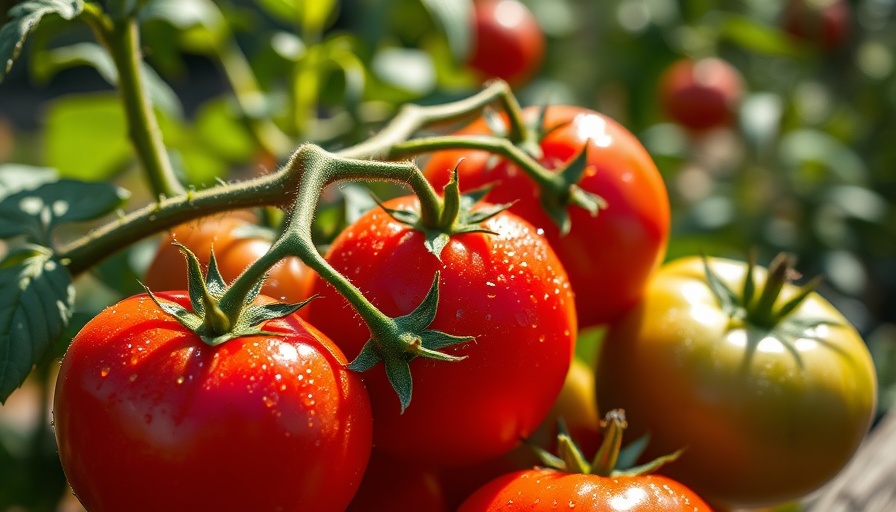
Why Mulching Your Tomato Plants is Non-Negotiable
As a garden enthusiast, you might ask, is mulching really important for my tomatoes? The resounding answer is yes. In many ways, mulching not only protects your plants but can significantly enhance their growth. It acts as a thermal blanket, maintaining soil temperatures to create optimal growing conditions.
Moreover, a good mulch will retain moisture in your garden beds, ensuring your tomatoes receive hydration between watering sessions, especially during those sweltering summer months. And let’s not forget the benefit of controlling weeds; a well-mulched garden reduces competition for nutrients, leading to more robust plants and, eventually, a more bountiful harvest.
Your Guide to Selecting the Best Tomato Mulch
When staring down the multitude of mulch options available, how do you pick the right one? Understanding your gardening goals and local climate can guide your decision. Below, we delve deeper into the seven top mulch types suited for your tomatoes, along with their specific benefits.
Compost: The Heart of Nutritional Balance
Compost is the gold standard for mulching due to its multifaceted benefits. Not only does it insulate roots effectively, but it is also a great way of enriching the soil. As the compost breaks down, it transports essential nutrients directly to the root structure of your plants. It works particularly well in cooler climates, where it can retain warmth from sunlight while boosting moisture levels.
Due to its dark color, it absorbs heat during the day while radiating it throughout the night, keeping your tomatoes cozy and happy. Moreover, compost is a sustainable choice, allowing you to recycle kitchen scraps and garden waste into a useful product for your plants.
Grass Clippings: A Thrifty Garden Resource
Many gardeners may overlook grass clippings from lawn mowing as a viable mulch. However, when used wisely, they can be a resourceful and eco-friendly option! Just remember to apply a thin layer to avoid creating a dense mat that restricts air and moisture.
A thin layer also allows the grass clippings to break down, enriching the soil naturally over time. They can help regulate soil temperatures, suppress weed growth, and improve moisture retention—truly a win-win solution for gardeners!
Pine Straw: A Lightweight Champion
Pine straw, often found in wooded areas or through local resources, is another excellent option for mulching tomatoes. Lightweight and decorative, this mulch helps retain moisture and provides essential nutrients as it decomposes. Its unique texture also makes it an ideal choice for controlling weeds. Pine straw decomposes slowly, so it lasts longer than many other organic mulches.
Leaf Litter: Nature's Giveaway
Another underappreciated option is leaf litter. Free and abundant in many regions during the fall, simply collecting fallen leaves can boost your garden! Leaf litter decomposes while providing coverage and insulation during cold snaps or heavy rains. The best part? It is entirely organic and biodegradable.
Straw: A Thematic Touch
Straw adds an aesthetic touch to your garden while doubling as a functional mulch. It assists in moisture retention and weed suppression. Straw is lightweight and easy to manage during application and is high in carbon, which can promote healthy soil once it breaks down. However, steer clear of hay, as it may introduce unwanted seeds into your garden!
Wood Chips: Long-Lasting Aesthetic Appeal
If you want a timeless, harder surface, wood chips may be your go-to option. This mulch works remarkably well with heavy foot traffic areas within your garden, as it’s sturdier than softer options. Wood chips decompose slowly, so they won’t need replacing often. A subtle disadvantage is that they may initially rob the soil of nitrogen as they break down.
Making the Right Choice - Considerations at a Glance
When choosing your mulch, consider factors like local climate, the specific growing conditions of your area, and personal gardening philosophy—whether you prioritize eco-friendliness, aesthetics, or moisture retention. Always remember to monitor your garden's specific needs and adapt your mulching strategy accordingly, as this can lead to an unprecedented tomato harvest!
Action Steps Towards a Bountiful Tomato Harvest
Implementing one or more of these mulching techniques will undoubtedly improve your tomato plant’s health and productivity! Think about what you already have at home or access through community resources, and start today. Happy gardening!
 Add Row
Add Row  Add
Add 




Write A Comment